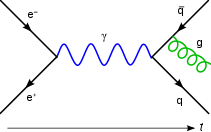Hideki Yukawa
Hideki Yukawa Osaka Imperial University | |
|---|---|
| Spouse | Sumi Yukawa |
| Children | 2 |
| Awards |
|
| Scientific career | |
| Fields | |
| Academic advisors | Kajuro Tamaki |
| Doctoral students | Kazumi Maki Mendel Sachs Donald R. Yennie |
| Signature | |
Hideki Yukawa
Biography
| Quantum field theory |
|---|
 |
| History |
| Standard Model of particle physics |
|---|
 |
Physics is a science that has made rapid progress in the twentieth century ... I desire, as I did in the past, to be a traveler in a strange land and a colonist in a new country. (from the foreword to his autobiography)
He was born as Hideki Ogawa in
Ogawa decided against becoming a mathematician when in high school; his teacher marked his exam answer as incorrect when Ogawa proved a theorem but in a different manner than the teacher expected.[3] He decided against a career in experimental physics in college when he demonstrated clumsiness in glassblowing, a requirement for experiments in spectroscopy.[3]
In 1929, after receiving his bachelor's degree at
In 1932, he married Sumi Yukawa (スミ). In accordance with Japanese customs of the time, since he came from a family with many sons but his father-in-law Genyo had none, he was adopted by Genyo and changed his family name from Ogawa to Yukawa.[3] The couple had two sons, Harumi and Takaaki. In 1933 he became a lecturer at Osaka Imperial University, at 26 years old.
In 1935 he published his theory of
In 1938, he received his
In 1940 he became a professor in
[Once I had published my seminal 1934 paper on particle interaction] I felt like a traveler who rests himself at a small tea shop at the top of a mountain slope. At that time I was not thinking about whether there were any more mountains ahead. [conclusion of his autobiography]
Yukawa became the first chairman of
He was an editor of Progress of Theoretical Physics,[8] and published the books Introduction to Quantum Mechanics (1946) and Introduction to the Theory of Elementary Particles (1948).
Activism
In 1955, he joined ten other leading scientists and intellectuals in signing the Russell–Einstein Manifesto, calling for nuclear disarmament.
He was one of the signatories of the agreement to convene a convention for drafting a
Retirement and death
Yukawa retired from Kyoto University in 1970 as a Professor Emeritus. Owing to increasing infirmity, in his final years he appeared in public in a wheelchair. He died at his home in Sakyo-ku, Kyoto, on 8 September 1981 from pneumonia and heart failure, aged 74. His tomb is in Higashiyama-ku, Kyoto.
Solo violinist Diana Yukawa (ダイアナ湯川) is a close relative of Hideki Yukawa.[citation needed]
Recognition

- 1940 – Imperial Prize of the Japan Academy
- 1941 – Academic Noma Award
- 1943 – Order of Culture
- 1949 – Nobel Prize in Physics
- 1963 – Elected a Foreign Member Royal Society (ForMemRS)[1]
- 1964 – Lomonosov Gold Medal
- 1967 – Pour le Mérite[12]
- 1967 – Medal of the Pontifical Academy of Sciences
- 1977 – Grand Cordon of the Order of the Rising Sun
- 1981 – Junior Second Rank (8 September; posthumous)
There is a street, Route Yukawa, named after Yukawa at CERN, Geneva, Switzerland.
Bibliography
- Profiles of Japanese science and scientists, 1970 – supervisory editor: Hideki Yukawa (1970)
- Creativity and intuition: a physicist looks at East and West by Hideki Yukawa; translated by John Bester (1973)
- Scientific works (1979)
- Tabibito (旅人) – The Traveler by Hideki Yukawa; translated by L. Brown & R. Yoshida (1982), ISBN 9971-950-10-3
See also
- Yukawa potential, an approximation for the binding force in an atomic nucleus
- Yukawa interaction
- Progress of Theoretical Physics
- List of Japanese Nobel laureates
- List of Nobel laureates affiliated with Kyoto University
- 6913 Yukawa– an asteroid named after Hideki Yukawa
References
- ^ JSTOR 769816.
- ^ "The Nobel Prize in Physics 1949". NobelPrize.org. 23 January 1907. Retrieved 17 March 2022.
- ^ S2CID 124612924.
- ^ a b Yukawa, H. (1935). "On the Interaction of Elementary Particles". Proc. Phys.-Math. Soc. Jpn. 17 (48).
- ^ https://www-yukawa.phys.sci.osaka-u.ac.jp/en/wp-content/uploads/2018/11/OU1938-Y1.pdf
- ^ "Hideki Yukawa - Scholars | Institute for Advanced Study". 9 December 2019.
- ^ ISBN 0-226-81304-5.
- ^ OCLC 44519062. Archived from the originalon 3 February 2002. Retrieved 3 March 2008.
- ^ "Letters from Thane Read asking Helen Keller to sign the World Constitution for world peace. 1961". Helen Keller Archive. American Foundation for the Blind. Retrieved 1 July 2023.
- ^ "Letter from World Constitution Coordinating Committee to Helen, enclosing current materials". Helen Keller Archive. American Foundation for the Blind. Retrieved 3 July 2023.
- ^ "Preparing earth constitution | Global Strategies & Solutions | The Encyclopedia of World Problems". The Encyclopedia of World Problems | Union of International Associations (UIA). Retrieved 15 July 2023.
- ^ "Hideki Yukawa". ORDEN POUR LE MÉRITE (in German). Retrieved 17 March 2022.
External links
- Hideki Yukawa on Nobelprize.org
- "Research Profile – Hideki Yukawa". Lindau Nobel Mediatheque. 23 January 1907. Retrieved 17 March 2022.
- Paper: On the Interaction of Elementary Particles. I – paper for which Yukawa received the Nobel Prize
- About Hideki Yukawa
- The short film "Yukawa Story (1954)" is available for free viewing and download at the Internet Archive.
- Works by or about Hideki Yukawa at Internet Archive

